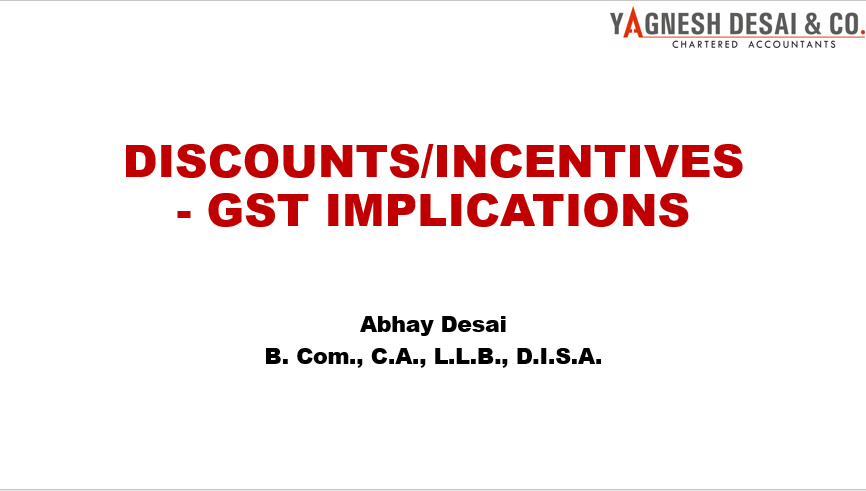DISCOUNTS/INCENTIVES- GST IMPLICATIONS
Table of Contents
DISCOUNTS/INCENTIVES- GST IMPLICATIONS
CHARGING PROVISIONS
- Sec 9(1) of the CGST Act, 2017
- Subject to the provisions of sub-section (2), there shall be levied a tax called the central goods and services tax on all intra-State supplies of goods or services or both, except on the supply of alcoholic liquor for human consumption, on the value determined under section 15 and at such rates, not exceeding twenty per cent., as may be notified by the Government on the recommendations of the Council and collected in such manner as may be prescribed and shall be paid by the taxable person.
SCOPE OF SUPPLY
- Sec. 7(1) For the purposes of this Act, the expression “supply” includes––
- (a) all forms of supply of goods or services or both such as sale, transfer, barter, exchange, licence, rental, lease or disposal made or agreed to be made for a consideration by a person in the course or furtherance of business;
VALUE OF SUPPLY
- Sec. 15. (1) The value of a supply of goods or services or both shall be the transaction value, which is the price actually paid or payable for the said supply of goods or services or both where the supplier and the recipient of the supply are not related and the price is the sole consideration for the supply.
DISCOUNTS
- Sec. 15(3) The value of the supply shall not include any discount which is given––
- (a) before or at the time of the supply if such discount has been duly recorded in the invoice issued in respect of such supply; and
- (b) after the supply has been effected, if—
- (i) such discount is established in terms of an agreement entered into at or before the time of such supply and specifically linked to relevant invoices; and
- (ii) input tax credit as is attributable to the discount on the basis of the document issued by the supplier has been reversed by the recipient of the supply.
Related Topic:
GST Implications on Deputation and Secondment of Employees
MEANING OF DISCOUNTS
- Southern Motors vs State of Karnataka 2017 (358) E.L.T. 3 (S.C.)
- A trade discount conceptually is a pre-sale concurrence, the quantification whereof depends on many many factors in commerce regulating the scale of sale/purchase depending, amongst others on goodwill, quality, marketable skills, discounts, etc. contributing to the ultimate performance to qualify for such discounts. Such trade discounts, to reiterate, have already been recognized by this Court with the emphatic rider that the same ought not to be disallowed only as they are not payable at the time of each invoice or deducted from the invoice price.
MEANING OF DISCOUNTS
- Southern Motors vs State of Karnataka 2017 (358) E.L.T. 3 (S.C.)
- “It is a matter of common experience that in the present contemporary competitive market, trade discounts not only are dependent on variable factors but also might be strategically not disclosable at the time of the original sale/purchase so as to be coevally reflected in the tax invoice or the bill of sale as the case may be. The actual quantification of the trade discount, depending on the nature of the trade and the related stipulations in any contract with regard thereto, may be deferred till the happening of a contemplated event, so much so that the benefit thereof is extended at a point of time subsequent to that of the original sale/purchase. That by itself, subject to proof of such regular trade practice and the contract/agreement entered into between the parties, would not render the trade discount otherwise legal and acceptable, either non-est or fictitious for evading tax liability.”










